divorce
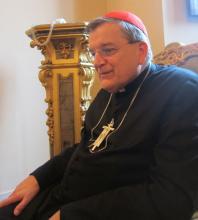
Public disagreements over whether the Roman Catholic Church can change its teachings on Communion for remarried Catholics are growing sharper on the eve of a major Vatican summit, with conservatives led by U.S. Cardinal Raymond Burke making another push against loosening the rules.
In a conference call with reporters on Sept. 30, Burke, who currently heads the Vatican’s high court, singled out the leading proponent of reforms, German Cardinal Walter Kasper, and his claims that critics of his proposals are really attacking Pope Francis.
Kasper has said that the pope supports his efforts to find ways to fully reintegrate divorced and remarried Catholics into church life. The proposals have become a prime focus of the upcoming Vatican meeting, called a synod, which will convene on Oct. 5 for two weeks to consider changes in family life in the modern world.
“I find it amazing that the cardinal claims to speak for the pope,” said Burke, the former archbishop of St. Louis, speaking from Rome. “The pope doesn’t have laryngitis. The pope is not mute. He can speak for himself. If this is what he wants, he will say so.”

Pope Francis made headlines this week when he officiated at the weddings of 20 couples, including some who had been living together and a woman who has a daughter from a previous relationship.
It was the first time that the Argentine pontiff had presided over a marriage ceremony since his election and it may have also signaled a dramatic shift in Catholic Church doctrine.
Now five conservative cardinals appear to be hitting back.
In a new book to be released days before the world’s Catholic bishops gather at the Vatican for their October Synod, the hard-liners are challenging moves to moderate church doctrine on marriage and offer Communion to divorced Catholics who remarry.
The book, Remaining in the Truth of Christ: Marriage and Communion in the Catholic Church, will be published in five languages, including English and Italian, on Oct. 1.

Faced with a cultural landscape that’s shifting faster than the church’s ability to keep up, Catholic bishops are looking for new approaches toward unmarried couples, divorced people, and single parents who are disillusioned with the church.
The first-ever survey of 114 bishops’ conferences around the world found that many Christians “have difficulty” accepting church teachings on key issues such as birth control, divorce, homosexuality, and cohabitation.
But one senior church leader cautioned that “the doctrine of the church is not up for discussion.”
The survey’s findings, released in a 75-page document by the Vatican on Thursday, will serve as the blueprint for October’s Synod of Bishops, when bishops from around the world will gather to discuss issues facing the family.

Americans are showing more tolerance for a range of behaviors, with sex between unmarried adults, medical research on stem cells from human embryos, and doctor-assisted suicide all showing record highs and increases in “moral acceptability” from last year .
The Gallup poll’s annual “moral acceptability” scale has been conducted since 2001 and charts shifting cultural attitudes on a number of hot-button social issues. In the 2014 list released Friday, Gallup researchers said 12 of the 19 categories reflected “levels of moral acceptance that are as high or higher than in the past.”
“Americans largely agree about the morality of several issues,” Gallup researchers said. “Most say birth control is acceptable but that extramarital affairs are wrong. However, other issues show clear, substantial divides. These differences are largely explained by party identification, but previous research has shown that age also plays a factor.”
Three issues — sex between an unmarried man and woman, medical research on embryonic stem cells, and doctor-assisted suicide — showed a slight increase in acceptability from 2013. Most of the other issues were mostly unchanged.

Khatoon Shaikh had no formal education, never worked outside the home, and lived in the kind of neighborhood that many people might call a slum.
But when Shaikh witnessed her sister-in-law victimized, first at the hands of a violent husband, and again by a patriarchal justice system, she took charge.
Shaikh started her own Shariah adalat, a court based on Islamic law, just for women.
“We needed a place where women’s voices could be heard,” the mother of seven said.
That was 20 years ago. Since then, the court has moved from Shaikh’s home to a two-room office in the north Mumbai neighborhood of Bandra. And it now operates within a broader organization called BMMA, or Indian Muslim Women’s Movement, which Shaikh helped form in 2007.
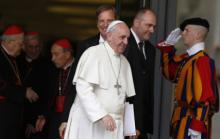
Pope Francis on Thursday opened a major two-day meeting on the church’s approach to the complexities of modern family life, telling the world’s Catholic cardinals that the church needs a “pastoral” approach that is “intelligent, courageous, and full of love” and not focused on abstract arguments.
In brief introductory remarks released by the Vatican, Francis pushed the closed-door summit of about 150 cardinals to “deepen the theology of the family and discern the pastoral practices which our present situation requires.”
He asked that they do so “thoughtfully” and by keeping the focus on “the beauty of family and marriage” while at the same time showing that the church is ready to help spouses “amid so many difficulties.” Francis added the phrase “intelligent, courageous, and full of love” extemporaneously.
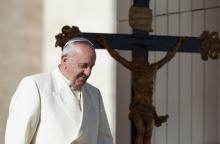
High-level debates over Catholic teachings on marriage and divorce and other hot-button issues heated up on Wednesday as a highly anticipated effort to overhaul the Vatican bureaucracy slogged through the devilish details of financial reform.
The multitrack talks launched months ago by Pope Francis ramped up this week as some 185 cardinals converged on Rome to watch the pontiff add 19 new members to their select ranks this weekend, part of what some called “the most critical week” of Francis’ year-old papacy.
Anticipation is mounting for a series of closed-door discussions on Thursday and Friday, when the cardinals will hold what are expected to be frank talks about issues such as contraception, cohabitation, gay marriage, and whether divorced and remarried Catholics can receive Communion.

Conservative Protestants in red states aren’t the only ones seeing high divorce rates — so are their neighbors, according to a new study.
Researchers found that simply living in an area with a large concentration of conservative Protestants increases the chances of divorce, even for those who are not themselves conservative Protestants.
According to researchers who took into account race, income, and other factors, marriage and fertility trends that are common among conservative Protestants — younger marriage, more kids, less higher education — affect all people in areas most populated by conservative Protestants, no matter their personal religious affiliation.

For a period in his younger life, the host of The Pete Holmes Show on TBS, which debuted late last year and follows Conan on late-night TV, was on a trajectory to become a youth pastor.
“That’s why I went to Gordon,” Holmes said, referring to his alma mater — Gordon College in Massachusetts, an evangelical Christian school — during a conversation on my back porch in Laguna Beach earlier this month.
“I wanted to be a pastor. I was going to be a youth pastor. I mean, I play guitar, I like to make people laugh. … The skill set of pastor and comedian are incredibly similar. You want to affect people. You’re good at reading rooms. You’re persuasive and you’re likable.”
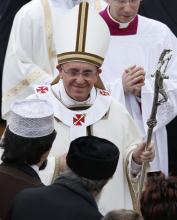
In an unusual move, the Vatican has asked the world’s bishops to quickly canvas the faithful for their views on topics like gay marriage, divorce, and birth control ahead of a major meeting of church leaders set for next fall.
But it’s not clear how or whether the American bishops will undertake such an effort, or if they will only send their own views to Rome.
The letter from the Vatican to New York Cardinal Timothy Dolan, president of the U.S. Conference of Catholic Bishops, was dated Oct. 18 and it asked that a series of questions be shared “immediately as widely as possible to deaneries and parishes so that input from local sources can be received” in time for a February planning meeting in Rome.
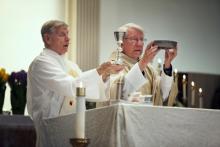
While the first months of Pope Francis’ pontificate have been marked by his attention to the poor and his “Who am I to judge” attitude on homosexuality, his pledge to tackle the ban on Communion for divorced and remarried Catholics could have the biggest impact for Catholics in the pews, especially in the U.S.
The current policy has caused what some call a “silent schism,” and bishops around the world concede that the ban has alienated untold numbers of Catholics and their families.
“I think this is the moment for mercy,” Francis told reporters when asked about remarried Catholics during a wide-ranging news conference on the plane back to Rome from Brazil in July.
Like the gay issue, Francis seems to favor a more pastoral approach to the equally perplexing question of “invalid” marriages — couples who remarry outside the church without getting an annulment, or those who do not get married in church in the first place.

In a bizarre case involving threats of kidnapping, beatings, and physical torture — including the use of an electric cattle prod — two rabbis were charged in New Jersey in a scheme to force men to grant their wives religious divorces.
Two others were also charged in the case, which grew out of an undercover sting operation involving a female FBI agent who posed as a member of the Orthodox community seeking a divorce.
As many as six others may also be charged, officials said.

Like most of the world last spring, I watched in fascination as Jorge Mario Bergoglio was elected pope. The first day, I was non-plussed. Another old, white guy? Big surprise. The second day, I began to take notice: he was a Jesuit and he chose the name Francis, the first pope ever to do so. The third day, I got a little discouraged as Catholic pundits and news organizations across the nation scrambled to prop up his conservative credentials and hardline stances. But as the week unfolded, I heard the stories of how he paid his own bills, carried his own bags, and rode in a modest sedan across town and my heart melted a little bit. Then came his ordination, and in one simple gesture, stopping to cradle a disabled man in his arms, he captured my imagination. I was willing to entertain the possibility that he just might be a different kind of pope.
The twin Supreme Court rulings on Wednesday that further opened the door for gay marriage in the U.S. were not entirely unexpected, and the condemnations from religious conservatives angry at the verdicts were certainly no surprise either.
So the real question is what gay marriage opponents will do now.
Here are four possible scenarios that took shape in the wake of Wednesday’s developments:

I’ve written before about the seemingly contrasting messages we offer to young people in church about sex and sexuality:
Sex is dirty; save it for someone you marry someday.
Umm, what? Granted, we walk a narrow rhetorical tightrope when discussing sex with our kids. If we tell them it’s actually pretty awesome, and then tell them they can’t do it, that’s a setup for failure. On the other hand, if we focus on the negatives, we risk scarring and shaming them into a life of emotional conflict and struggle when it comes to sexual intimacy.
What we end up with, often times, is a vacuous silence when it comes to the real, difficult issues of sexual identity, impulse, and expression. Add to that the Christian emphasis on marriage, and the result in many cases is scads of unhealthy, sexually awkward young people, married far too early with no idea why.
WITH TROUBLING DIVORCE RATES, the trend among younger couples to postpone marriage or abstain from it altogether, and other factors, some feel we are in danger of losing marriage in this society. The institution is arguably in serious trouble.
This period of intense media focus on marriage—while more and more states legally affirm marriage equality and the Supreme Court ponders two related cases—offers the opportunity to examine the institution of marriage itself. How can we strengthen and support marriage, a critical foundation of a healthy society? How can we, as church and society, encourage the values of monogamy, fidelity, mutuality, loyalty, and commitment between couples?
A study by the Barna Research Group a few years ago found that “born again Christians are more likely than others to experience a divorce,” a fact that pollster George Barna said “raises questions regarding the effectiveness of how churches minister to families.” Our authors in this issue wrestle with what it takes to build long-lasting marriages, rooted in and offering a witness to God’s covenantal love. —The Editors
MY HUSBAND AND I have been married to each other for 42 years. Does this make me an expert on heterosexual marriage? Not really.
My experience over 40 years as a pastor, teacher, and theologian helps some in thinking about marriage, as I have counseled couples and performed countless weddings, in addition to my personal experience. But as a contextual theologian of liberation, I know that to extrapolate from your own experience, or even from that of a small group, means you end up colonizing other people’s experiences through ideological privilege. In short, what that means is you think you know more than you really do. Hence, using social, political, and economic analysis is crucial if we are to think theologically in context about marriage.
A couple of things seem clear, however. Marriage, in all its manifestations, is going through tremendous change in our society, and marriage as a social and political institution, and as a religious practice, needs strengthening.

In the fourth chapter of John’s Gospel Jesus speaks with a woman when they find themselves alone at a well at midday. We can learn a lot from what he says to her, and from what he chooses not to say.
Jesus tells the woman, “Go, get your husband, and bring him here.” She replies, “I have no husband.” Jesus tells her “That’s right. You’ve had five husbands, and the man you’re now with isn’t your husband.”
These could have been shaming words. In her culture, to be without a husband is to risk economic ruin, and to have been divorced by your husband is to be shamed.
Had he wanted to, Jesus could have scored some serious points here: I’m a prophet, and you’re a sinner. I’m celibate, and you’re promiscuous. You are living in sin by living with a man who is not your husband.
Evidently, he didn’t want to say those things.
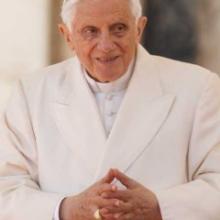
VATICAN CITY — Pope Benedict XVI has asked the Vatican’s highest appeals court to consider reviewing church rules on marriage annulments — a statement that may signal a change in tone more than a change in substance.
Speaking on Jan. 26 to the members of the tribunal of the Roman Rota, Benedict said that “lack of faith” on the part of the spouses can affect the validity of a marriage.
While the Catholic Church forbids remarried divorcees from taking Communion, church tribunals can declare a marriage void if it can be demonstrated that some key elements — such as a commitment to have children — were missing in the first place.
Kenyan church leaders are lining up in opposition to proposed new marriage bills, which they say will weaken marriage by allowing cohabiting couples to register as married.
One bill would bring Christian, Hindu, Muslim, civil, and customary marriages under one law, and another would give spouses and children more rights to property. The twin bills were approved by the cabinet on Nov. 9 and are scheduled to be debated by Parliament before Christmas.
“It is the worst law we have had as churches in Kenya. It compromises the standards of Christian marriage and divorce. Instead of three grounds for divorce, we now have nine,” said the Rev. Wellington Mutiso, the general secretary of the Evangelical Alliance of Kenya.
New Jersey lawyer Abed Awad has been involved with more than 100 cases that involved some component of Shariah, or Islamic law, and knows firsthand how complicated things can get.
In one of those cases, a woman claimed she was married to a man according to Islamic law in her native west Africa. The man asserted there was no valid marriage, leaving a judge to decide whether the two were ever legally married in the first place.
If the judge rules they were married, there will be a divorce, and she will receive alimony and a share of marital assets. If the judge rules that there is no marriage, then the woman will be left with nothing from her relationship.
To make a ruling, the judge will need to consider what Shariah, as understood in one corner of western Africa, says about what constitutes a legal marriage. He will likely have to consult Islamic law experts and apply what he learns to his decision.
But what if American judges were prohibited from considering Shariah and other foreign laws, as many state and national politicians want to see happen?